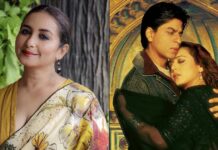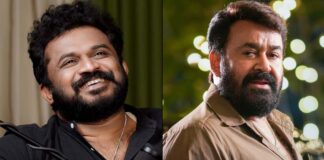Star cast: Luv Sinha, Ferena Wazeir, Rishi Kapoor, Hema Malini, Rekha.
Plot: Luv Sinha is a born Muslim who is raised by Hindus as a Hindu child. He falls in love with a Muslim girl, Ferena. His Muslim parents are traced by his Hindu foster parents and melodrama follows.
What’s Good: Adnan Sami’s melodious music which hasn’t got a chance to grow; some performances by the veteran actors.
What’s Bad: The newcomers; the dated story; the flowery dialogues of a bygone era.
Verdict: It would’ve worked had it come sadiyaan ago. But in today’s age, it stands no chance!
Loo break: The melodramatic sequences post-interval.
Inderjit Films Combine’s Sadiyaan is a love story set in the late ’60s. The story begins in the pre-Independence days when Muslims had to flee strife-torn India and likewise, Hindus had to escape from Pakistan reeling under communal tension. Rajveer Singh (Rishi Kapoor), his wife, Amrit (Rekha), and their extended family, along with thousands of other Hindus, land in India and are given accommodation by the government in homes vacated by the fleeing Muslims. As luck would have it, Rajveer and Amrit find a little Muslim boy in the haveli allotted to them. It is clear that the kid’s family may have escaped, leaving behind the little one by mistake or mishap. After efforts to locate the child’s Muslim parents fail, Rajveer and Amrit happily adopt the child and raise him as their own, having lost their own child in riot-torn Pakistan.
Shaan alias Ishaan, although born a Muslim, therefore, grows up as a Hindu and is the apple of the eye of his parents. He too loves and respects them, unaware that he is not their real son. On a college trip to Kashmir, Shaan (Luv Sinha) falls in love with Chandni (Ferena Wazeir). Their love blossoms but the two are shocked when they realise that they belong to different communities. All hell breaks loose in Chandni’s family when her fanatical father (Deep Dhillon) and grandfather (Ahmad Khan) object to her marriage to a Hindu boy.
It is then that Rajveer Singh and Amrit decide to reveal the truth about their son’s true lineage so that he can get married to the Muslim girl he loves. Shaan’s real parents, Parvez (Jawed Sheikh) and Benazir (Hema Malini), are traced and they are given the good news that their son is alive. They are overjoyed as they had assumed that he would have been killed in the chaos that resulted in the mass exodus of Muslims from India even as fundamentalist Hindus were attacking them. They soon come to India, grateful to Rajveer Singh and Amrit. Shaan, however, refuses to accept his new parents as his real parents. He, in fact, is prepared to forget Chandni but is not ready to leave Rajveer Singh and Amrit. Of course, Rajveer Singh and Amrit make him see reason.
Chandni’s parents are happy to learn that Shaan is a Muslim and decide to get the two lovers married. Meanwhile, Parvez makes all preparations for Shaan and Chandni’s departure to Pakistan where they would settle with them (Parvez and Benazir). Even the thought of the pangs of separation is too much for Shaan, Rajveer Singh and Amrit to bear. Do Chandni and Shaan get married? Do they leave India? What stand do Chandni’s parents take on the point of Shaan settling in Pakistan/India? Do Amrit and Rajveer Singh accept the relocation of Shaan? What does Benazir think of uprooting Shaan from India? And what is Shaan’s stand on this point? These questions are tackled in the climax.
The story (Raj Kanwar) about inter-communal love is as old as the hills. In fact, such stories don’t have much relevance today because inter-communal marriages are quite common today as compared to, say, the sixties. The viewer gets a feeling that it is probably because the story has such little relevance today that the writer-director chose to simply place the drama in the 1960s. Not that it serves much of a purpose because except for stating that it is a story of the ’60s, there is not much else to suggest that. And, in any case, the question is about such a story appealing to the youth today, which doesn’t really give too much importance to religions and communities when it comes to matters of the heart, at least in the big cities.
Not just the basic plot but even the screenplay (Raj Kanwar) and the dialogues (Javed Siddiqi) seem to be of an era gone by. Writers Raj Kanwar and Javed Siddiqi have penned long-winding scenes and flowery dialogues and philosophical thoughts in the age and time of short messaging service (sms), something which the youngsters will detest.
Even otherwise, Kanwar’s screenplay is full of holes. Rajveer Singh and Amrit react so melodramatically to Parvez’s suggestion of taking Shaan with him to Pakistan that it would seem they (Rajveer and Amrit) had never thought of such an eventuality. However, the truth is that the moment they succeeded in making contact with Parvez and Benazir, the first thought that should have crossed their minds is that Shaan would have to leave them soon. If they would’ve behaved like normal, thinking adults, there would not have been room for melodrama of the kind experienced when Parvez breaks the news that Shaan would be leaving for Pakistan. But Raj Kanwar dishes out melodramatic fare for the audience even if that part of the high-pitch drama looks fake right from the word ‘go’.
There is yet another flaw. Before contact can be established with Shaan’s real parents in Pakistan, Shaan tells Amrit, he would rather not marry Chandni than get married to her at the cost of Amrit’s tears when she (Amrit) tells him the truth about his real parents and about revealing all to Chandni’s parents. But at that juncture, where was the situation of getting married to Chandni at the cost of Amrit’s tears? Amrit was doing this for Shaan’s happiness as also her own. When Amrit was unaware that revealing the truth about Shaan’s real identity would ultimately lead to her misery, how did Shaan imagine so? Is the writer trying to say that Shaan was smart enough to know of the ultimate consequence while Rajveer Singh and Amrit Kaur were dumb asses to not even think of the same? Frankly, on watching the film, it is crystal clear that that was not the intention of the writer. Rather, Raj Kanwar has written a screenplay of convenience and not really bothered about the logic so that the script appears like a haphazard piece of immature writing.
Luv Sinha does a strictly average job in his debut attempt. He needs to work harder on his dialogue delivery and facial expressions. Ferena Wazeir is also very average in her maiden job. She needs to infuse life into her acting. Both the newcomers also need to brush up on their dancing skills. Rishi Kapoor is earnest and sincere. Rekha is good but she does go overboard in emotional and dramatic scenes. For instance, she behaves rather weirdly when Shaan announces that he has to go to Kashmir. Hema Malini is suitably restrained. Jawed Sheikh does a fair job. Vivek Shauq has funny lines to mouth and he does justice to his role. Gurpreet Ghuggi is natural. Deep Dhillon (in coats two sizes bigger) passes muster. Navni Parihar, Avtar Gill, Rekha Rao, Rakhi Vijan, Ahmad Khan and the rest provide ordinary support.
Raj Kanwar’s direction, like his script, has the formulaic style. Cinema has changed over the years but Kanwar seems to be stuck to the formula of the eighties and nineties. The film’s music (by Adnan Sami) may not be very popular but it is melodious. The title track (excellent rendition) has pain in it. ‘Sona lagda’, ‘Sargoshiyan’, ‘Manmouji matwala’, ‘Taaron bhari’, ‘Pehla pehla tajurba hai’ and ‘Jaadu nasha’ are also all well-tuned numbers. Choreography is average except in the ‘Sona lagda’ song. Camerawork (Anshul Choubey) is very eye-pleasing. Action scenes (Abbas Ali Moghul) are well-composed. Climax is a tear-jerker but by the time the climax comes, the audience has been bored to death. Editing (Kuldeep Mehan) should’ve been sharper.



 Follow Us
Follow Us








